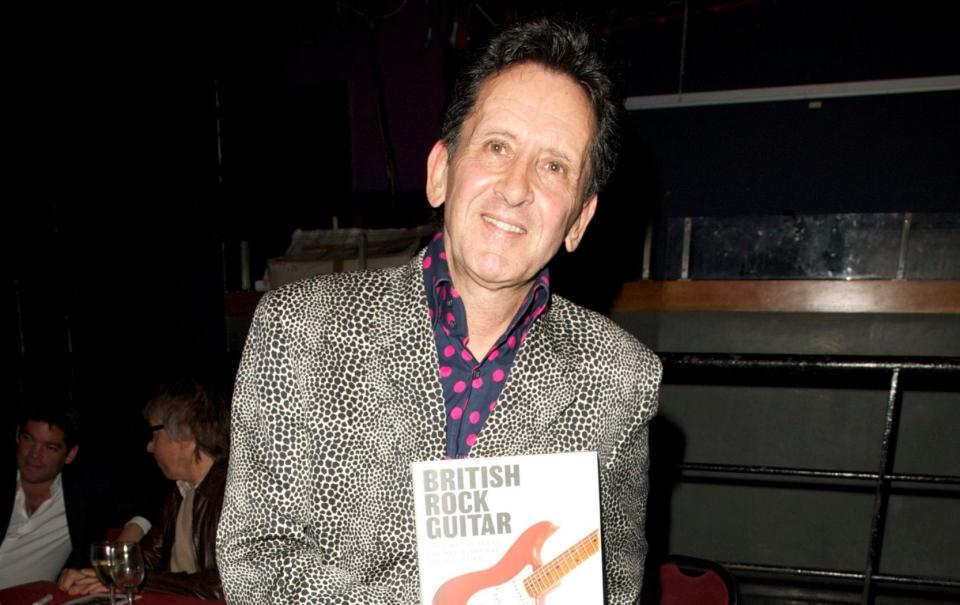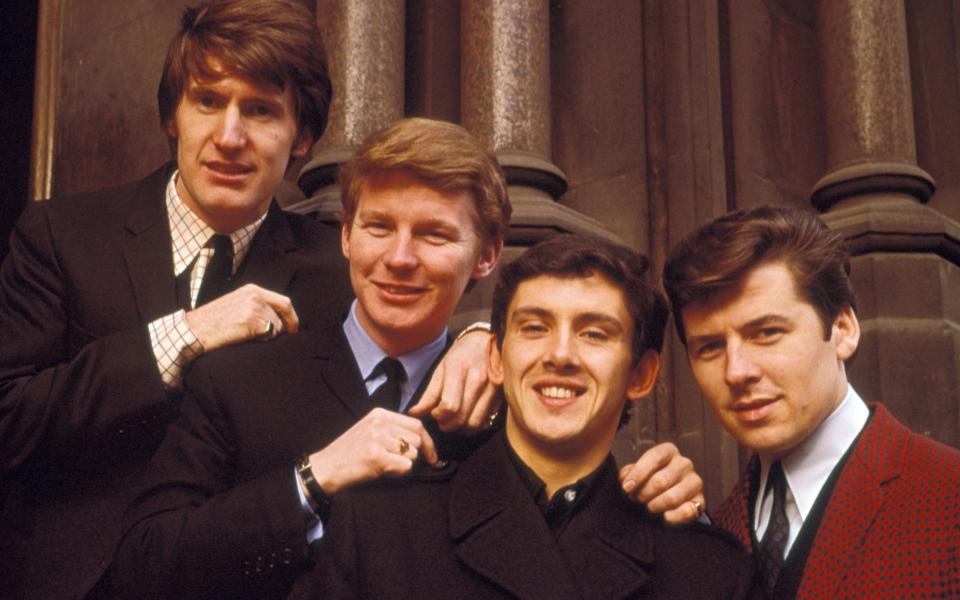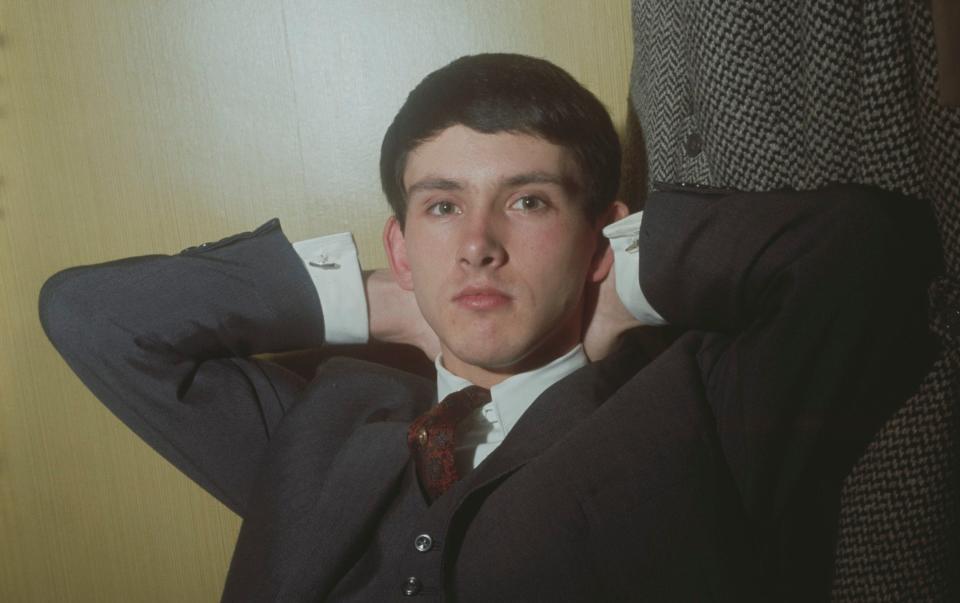‘John Lennon stared at me like a snake about to eat a rabbit and said my harmonies were ridiculous’

Bass guitarist and singer Frank Allen, 79, performed with Cliff Bennett and the Rebel Rousers before joining the Merseybeat band The Searchers in 1964.
The Searchers, formed by John McNally and Mike Pender in 1959, had three UK number one hits: Sweets for My Sweet (1963), Don’t Throw Your Love Away (1964) and Needles and Pins (1964). Allen has written two books, including The Searchers and Me, the definitive biography of the band. He lives in west London.
Did you have a good financial start in life?
I had a poor upbringing but everyone I knew was in the same boat. My parents were Scottish Presbyterian from Greenock in Renfrewshire and moved to Hayes in Middlesex when the Clydeside shipyards were bombed during the war. I was the first in the family to be born in London. We lived in a Nissen hut before we were given a council house in neighbouring Harlington.
Dad started out as a painter and decorator but went on to work as a cleaner for British Airways, while Mum worked as a school dinner lady. My parents never allowed themselves to get into debt and that frugality was instilled in me.
How did you get into music?
I was always interested in pop music, but when I first heard Elvis singing Heartbreak Hotel my education was forgotten. I joined a skiffle band at school. We were semi-professional by the time I left in 1960, but I still got a ‘proper’ job as a despatch clerk at Penguin Books for £6 a week.

After about a year and a half I talked my way into joining Cliff Bennett and the Rebel Rousers. I performed with them for three years, first on rhythm guitar and then bass. By the time I met The Searchers in Hamburg, we had released six singles but didn’t have a sniff of a hit.
Did you meet The Beatles in Hamburg?
Yes, I saw their last performance at the Star-Club in 1962, although they were just this unknown band from Liverpool back then who had somehow got a recording contract. Their first single, Love Me Do, wasn’t such a big deal because it only reached number 17 in the charts.
I first bumped into John Lennon backstage. He stared at me like a snake that was about to eat a rabbit and said: “I gather that after Cliff [Bennett] you’re the most popular member of the band. I can’t think why. Your harmonies are ridiculous.” I wasn’t sure if I’d been insulted or this was just his Liverpudlian sense of humour.
What has been your worst financial decision?
I nearly turned down the chance to be in The Searchers. I befriended them at the Star-Club because they were my kind of people – nice, clean-living lads who barely drank and wrote home to their fiancés. But when they invited me to join the band, I said no. The Rebel Rousers had just been signed by manager Brian Epstein and I didn’t want to rock the boat.
When, a couple of weeks later, I told our sax player I’d turned down one of the biggest bands in the country, he said, “Don’t be stupid. Get on the phone, tell them you want the job and ask if they want a sax player as well.” I was taken on at £100 a week, which was good money.
What were The Searchers’ greatest hits?
They’d already had three top singles by the time I joined, but I was on their next big hit, When You Walk In the Room (1964), which reached number three in the charts. For me, it’s still the best single of The Searchers. I’m guessing The Searchers’ highest-earning single is Needles and Pins because that’s the band’s biggest hit, but it’s hard to say because our royalties are now accrued through compilations.

Why do you think the band was so popular?
We didn’t slavishly copy a song. The Searchers would look at an arrangement and figure out how to make it better. Our clean-cut image also enabled us to appeal to a broad fanbase. The kids liked us but the parents did, too.
What did you earn in royalties?
It was about 2.5pc. Eventually, it went up to 4pc. There were no bad record deals because they were all bad. Even The Beatles were on those kinds of deals. In some ways it worked to a band’s advantage. Royalties were so poor that record companies could afford to indulge bands and pump money into recording sessions.
Have you ever struggled to pay the bills?
The nearest I came was when the hits dried up in 1967. This was when John and Mike invited me to join them as a full partner because they couldn’t afford to pay my wages. By this time we were performing on the cabaret circuit and paying ourselves a pittance. You wouldn’t believe the figure. We had to stop staying in hotels and went back to travelling in a van.
Was there a danger of the band folding?
Yes, when lead singer Mike Pender left to go solo in 1985. John and I feared that Mike, as the lead singer, would take the fans with him. Nevertheless, we decided to keep going and reached a signed agreement with Mike whereby we would retain the original band name and he would perform under the title, Mike Pender’s Searchers. We quickly discovered, however, that his band was still being advertised as The Searchers all over the country.
Mike’s not a bad guy but we were forced to fight tooth and nail for our survival. First, we sued the clubs involved, then we were going to sue Mike. On the day we were due to go to court, however, he backed out and agreed to our terms. A court order with regard to use of the name was put in place but we later found a couple of contracts that Mike had signed as The Searchers. This was contempt of court, so we went back to court again – and won.
It’s such a shame that legal wrangles were necessary. We should have got over these things and become chums again. We had good times together. Groups are like marriages and the divorce is always a nightmare.
You’re about to go back on the road. Do you worry that your fanbase is dying off?
Inevitably, you lose people but you gain others as well. We appeal to a wide audience because we perform nice, unthreatening songs. Everything is so serious these days. Can you imagine anyone writing another Teenager in Love? All songwriters do nowadays is air their dirty laundry. I expect Prince Harry will be doing a record soon. He and Meghan will be the new Sonny and Cher.
The Searchers’ Thank You Tour runs from April 13 until June 17, with 43 dates across England. The Ultimate Collection (3CD) is out now on BMG. Tickets, dates and info: the-searchers.co.uk

 Yahoo Finance
Yahoo Finance 